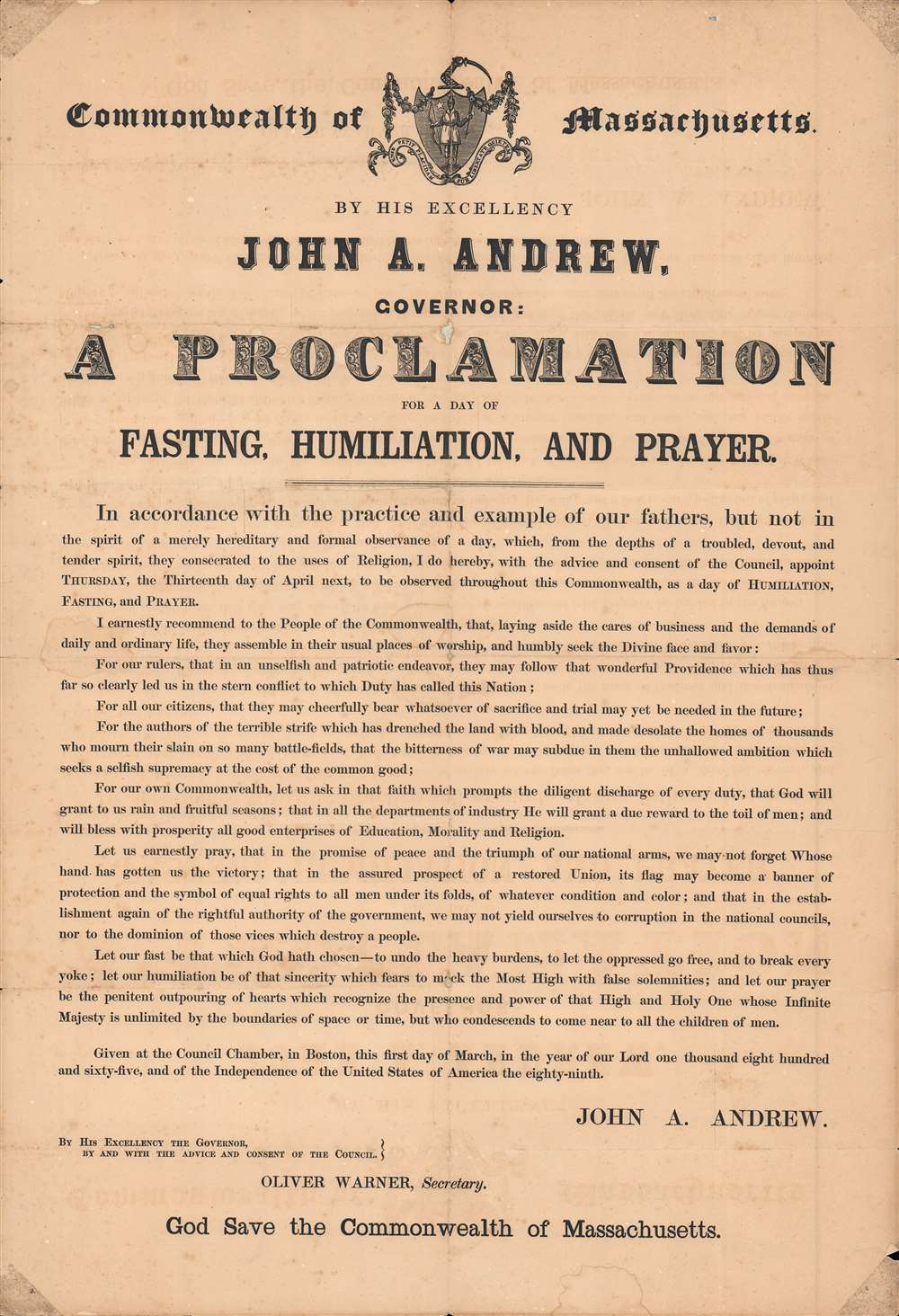1865 Massachusetts Gov. Proclamation for Fasting and Prayer over Civil War
MAProclamation-andrewjohn-1865
Title
1865 (dated) 29 x 19.75 in (73.66 x 50.165 cm)
Description
A Closer Look
This proclamation, issued near the end of the war, set aside April 13 as a special day to reflect on the conflict and hopes for its rapid conclusion. Incidentally, April 13 turned out to come just days after the surrender of Robert E. Lee at Appomattox Courthouse. The broadsheet focuses on the present conflict, the sacrifices it entailed, and the guiding hand of Providence in determining the course of the conflict. As discussed below, Andrew was a committed abolitionist and a powerful advocate for enlisting black soldiers in the Union Army. His religious beliefs and moral commitments are clear in his framing of the day of fasting and prayer.Gubernatorial Proclamations
Gov. Andrew was not the first to issue such a proclamation, which were a regular feature in the early American Republic. For instance, in the wake of the Boston Tea Party and the British Parliament's 'Intolerable Acts,' the Virginia House of Burgesses proclaimed a 'Day of Fasting, Humiliation, and Prayer.' Governors of Massachusetts John Hancock and Increase Sumner issued such proclamations in the years following the Revolutionary War, which apparently influenced Andrew's own 1862 proclamation, issued at a low point for the Union during the Civil War.However, the immediate impetus for this proclamation appears to have been a similar one issued by President Lincoln the previous July (1864). By this point, the Union had turned the tide in the war and was clearly heading towards victory, but at a terrible cost. It is worth mentioning that Andrew issued another proclamation just three months after the present one, following the assassination of Lincoln.
Publication History and Census
This broadsheet was issued on March 1, 1865, by Governor John Andrew and distributed throughout Massachusetts. It can easily be confused with the similarly titled proclamation by Andrew following Lincoln's assassination, as well as his 1862 proclamation along the same lines. The intermingling of these three documents, as well as digital and physical examples thereof, in catalog listings makes an accurate census difficult, but this broadsheet looks to be held by five institutions and has no known history on the market.Cartographer
John Albion Andrew (May 31, 1818 – October 30, 1867) was the 25th Governor of Massachusetts, coinciding with the U.S. Civil War. Andrew studied at Bowdoin College and then began a career as a lawyer in Boston. Already an ardent abolitionist from his teenage years, Andrew became involved in politics, joining the Whig Party's anti-slavery wing. He dedicated his efforts to defending fugitive escaped slaves and freedman accused of being escaped slaves. He was an early member of the Republican Party in Massachusetts and helped to arrange the legal defense of John Brown after the latter's raid at Harper's Ferry. Running for governor in 1860, he won easily on the Republican ticket. Sensing the likelihood of conflict, he began preparing for war before the events at Fort Sumter. Throughout the war, he pressured President Lincoln to end slavery and was an early advocate for enlisting black men in the Union Army, resulting eventually in the creation of the storied 54th Massachusetts Infantry Regiment and other units. However, he took a less radical approach than many Republicans towards Reconstruction and was willing to compromise on the civil rights of freedmen for the sake of reconstituting the Union. More by this mapmaker...

